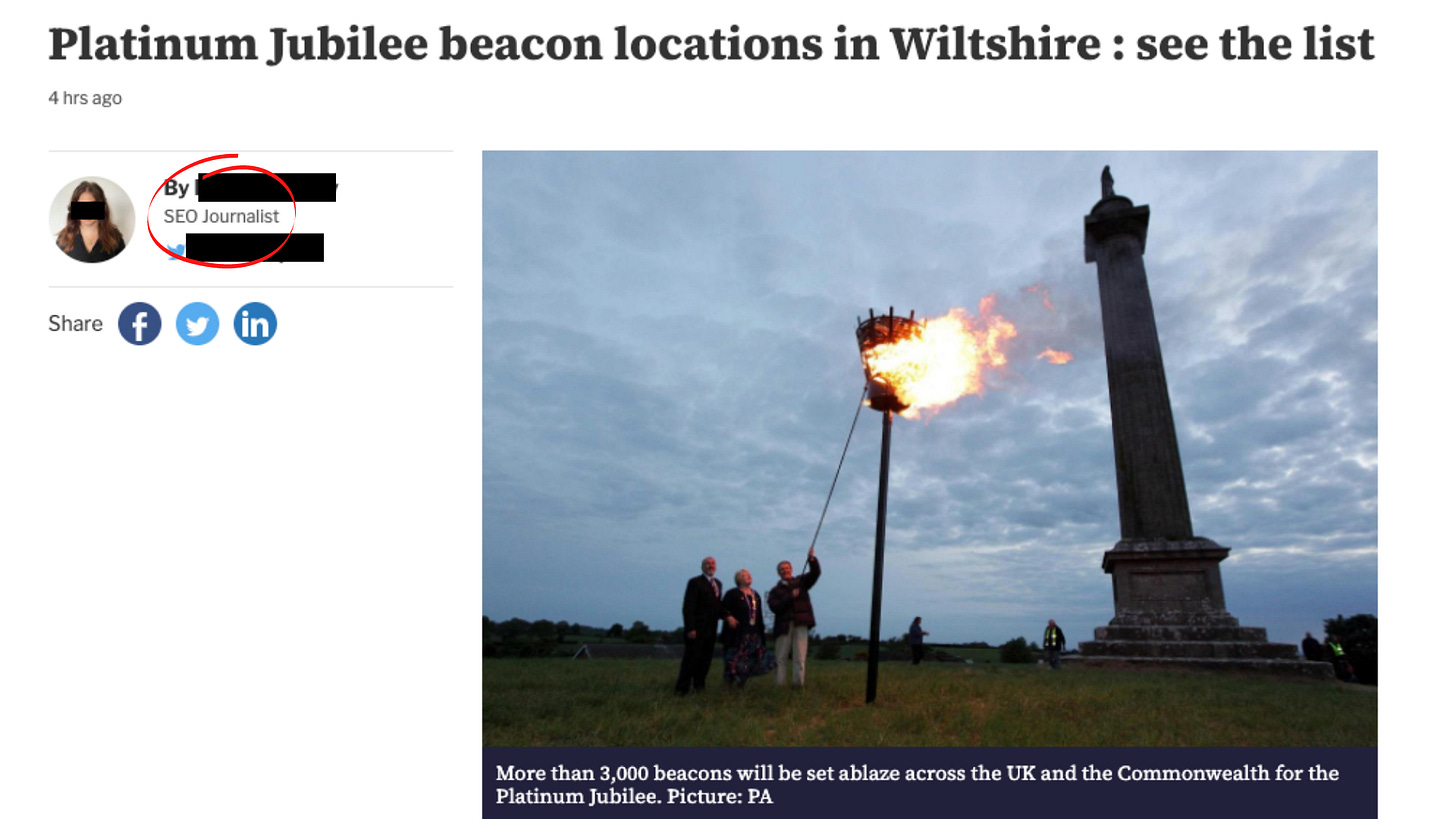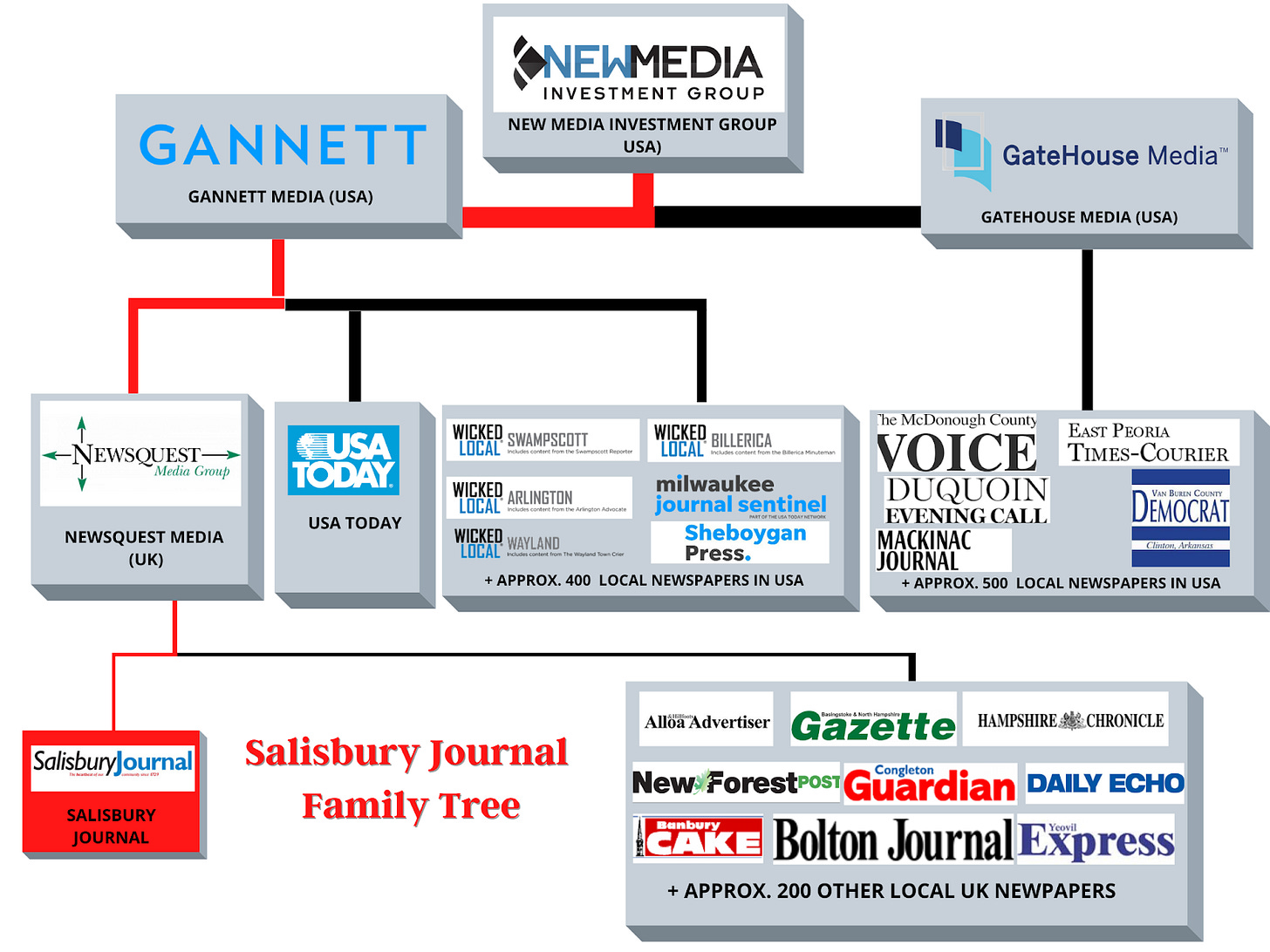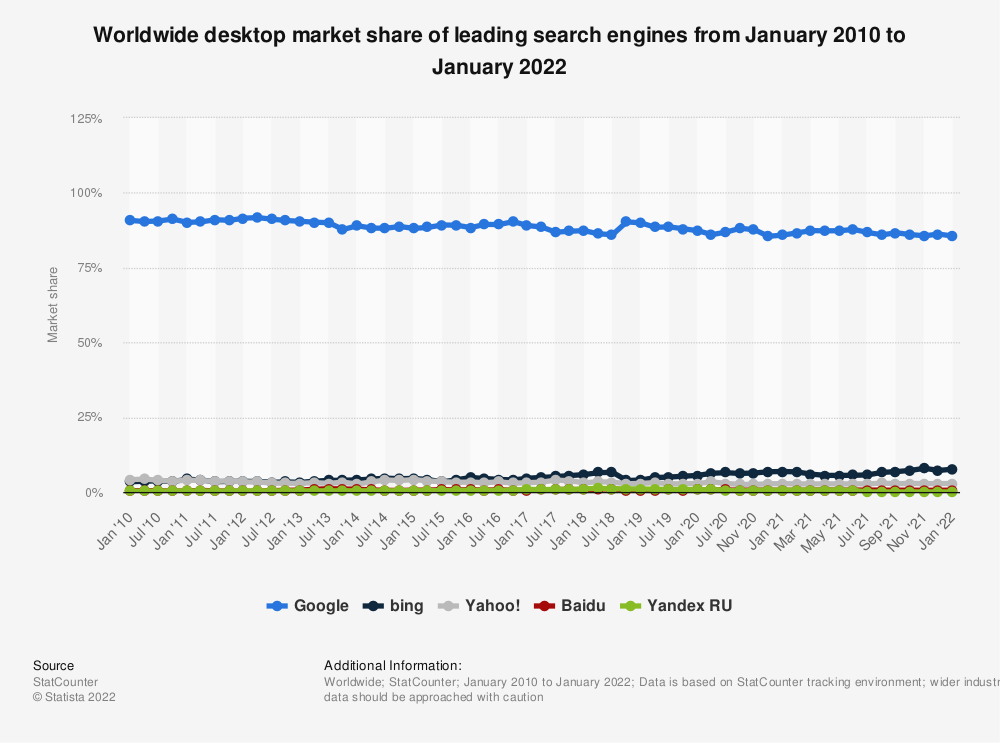What a new job title in a ravaged industry tells us about the crisis in local newspapers, and a rare bright light in local journalism’s desolate landscape.
Have you seen the words ‘SEO’ and ‘journalist’ next to each other yet?
If not, and if you haven’t yet given up on journalism altogether, you’ll come across this neologism before long.
The concept of ‘SEO journalism’ has been around a couple of years. It first appeared in analyst surveys and shareholder reports related to media conglomerates, and then migrated to job ads.
Now, this phrase can be found beneath bylines in your local newspapers.
Here’s one from the Salisbury Journal.

The Salisbury Journal is part of the 200+-strong stable of once-independent titles that are now owned by Newsquest Media Group.
Newsquest, the UK’s biggest local news media agglomerator, is owned by US media giant Gannett.
Gannett is America’s #2 local newspaper conglomerate, second only to GateHouse Media.
Since 2019, both Gannett and GateHouse have been owned by New York hedge fund New Media Investment Group.
Confused? A family tree may help.

Three Questions
So.
- What’s an ‘SEO Journalist’?
- What’s this got to do with who owns your local paper?
- Why should either of these questions bother us?
‘SEO’ is a familiar term to anyone whose job involves attracting online eyeballs. Until the Internet, it meant Senior Executive Officer, but now it’s Search Engine Optimisation.
Or you may know it as ‘clickbait’.
Basically, SEO = second-guessing the black boxes of code that constitute the algorithms of search engines like Google, in order to shunt content up the search result rankings.
Who are we kidding? Not ‘search engines like Google’, but Google. How many other search engines can you name, let alone have used, in the past year?
How dominant is Google? Sometimes you just can’t beat a graph.

So, SEO expert = Google Guesser.
Page One or Bust
Here’s what one SEO consultancy says about the importance Google Guessing in general, and making Page One in particular.
The first page of Google receives 95 percent of web traffic. Perhaps more importantly, 90% of clicks on the first page of Google’s search results are made on organic links, and the other 10% go to paid ads. [reputationx.com]
Any shareholder financing one of our SVOs (Silicon Valley Overlords) will tell you,
‘traffic’ = clicks = eyeballs = advertising = Cold Hard Cash
SEO Google Guessers explain that if you want to make money, you just gotta make Page One of any Google Search. There’s the shortcut taken by 10% of the names you see – paying Google cold hard cash – but the other 90% got there ‘organically’.
If you associate the word ‘organic’ with farmers markets rather than eyeball markets, here’s how another purveyor of Google Guessing uses it in their definition of SEO Journalism:
“SEO Journalism is the practice of increasing the quantity and quality of traffic to your website through organic search engine results.” [Moz.com]
Still wondering what’s so artificial-fertiliser-free about clickbait?
‘Organic’, in this context, means ‘free’, i.e. without paying Google to push your favoured string of characters up the rankings.
Again, at the risk of stating the obvious:
Google revenue = Online artificial fertiliser = Cold Hard Cash.
We’ll leave you to come up with any extended metaphors involving nitrate run-off polluting our waterways and killing off biodiversity.
Now you know that Google is nothing more than a big old advertising company, and now you’ve cracked the jargon of ‘SEO’ and ‘organic results’, we can get to our point about ‘SEO Journalism’.
Advertising, Writing and Journalism
In the 1960s, in order to sell more stuff, the advertising agencies of Madison Avenue paid newspapers and TV stations to reach your eyeballs.
Now, in order to sell more stuff, SEO experts pay SVOs like Google and Facebook to reach your eyeballs.
What do old-school Mad Men ‘advertising’ and the modern SEO voodoo of getting punters to click on your content have in common? Plenty.
Experts Then/Now require similar skill sets:
- Exploiting Media:Then -newsprint, billboards & TVNow -websites and mobile phones
- Wordsmithery:Then – in printNow – on screen
- Human Psychology:Then – catch eyes to read onNow – bait your mouse to click through
What does any of this have to do with journalism?
Look at that skill set: Exploiting Media, Wordsmithery and Human Psychology. This is not just the Advertiser’s Toolkit, but any writer’s toolkit.
Whether communicating profound truths about the human condition in a Booker Prize-winning novel, or informing us where we can see beacons being lit for the Queen’s jubilee in a British local newspaper, writers and advertisers deploy similar techniques. They play on similar foibles and work with similar instincts.
SEO Journalism
So what’s an ‘SEO Journalist’?
How better to find out than by typing ‘SEO journalism’ into Google Search, and seeing what appears on Page One…
Here’s a summary of an article by a Google Guessing consultancy. If they appeared on Page One, they must have some idea what they’re talking about…
It’s called ‘5 essential SEO tips for journalists’.
Demonstrating the very clickbait techniques it’s peddling, but without mentioning the word ‘listicle’, this listicle informs us that:
‘SEO for journalists has to be a priority when publishing content online. How do you write strong SEO content as a journalist? There are five essential SEO tips and tricks to keep in mind when crafting your content.
- User experience comes first
- Be wise with your words
- Go mobile
- Keep things speedy: page load speed
- Branch out
There’s loads more, but we’ve spared your wincing from all the jargon about ‘user journeys’, ‘website structures’, ‘exploring content partnerships’, and – most painful of all – ‘tidying up content in the back end’. Quiet at the back, now, settle down.
Instead, we draw your attention to what we see as giveaway phrases. Like these:
- Answer the questions you know your audience is looking for
- Readers are not easily fooled
- Be sure to answer the most popular questions on your chosen theme
- For some easy tips and tricks, check out the SEO tools in this piece
- Today’s audiences are used to instant gratification
- Getting your content in front of as many eyes as possible is the goal
- Every journalist hopes their content will go viral
Does any of this sound like what you understand ‘journalism’ to mean?
Us neither.
Remember ‘Journalism’?
Back to Google Search. This time we’re typing in ‘ethical journalism’.
A dip into the Page One articles throws up these kind of phrases
Obligation to the truth
Journalists must maintain independence from those they cover
Provide a public forum for criticism and compromise
Independent monitor of power
Journalists must be allowed to exercise personal conscience
Good journalists make the important interesting and relevant
In short, journalism puts the horse of independence in front of the cart of public opinion.
SEO does the reverse.
The job of the SEO Journalist is not to inform and shape public opinion, but to second-guess it, and then serve it. The SEO Journalist Identifies what we want, then gratifies it to maximum effect.
So SEO Journalism involves an awful lot of ‘SEO’, and precious little ‘journalism’.
‘SEO Journalism’ is paradoxical, even oxymoronic.
Why Should We Care?
Not every independently-owned newspaper over the past three centuries has always lived up to the lofty aspirations we found when we Googled ‘ethical journalism’.
But at least, by and large, they all shared such aspirations.
This is why our hearts sink at the reality of young people setting out on a career in ‘journalism’, only to find ads for ‘SEO Journalist’ positions.
It must be hard to reconcile what they were taught about journalism at college, all that guff about independence, speaking truth to power, holding power to account etc, with being paid by corporate-owned advertising platforms to Google Guess in order to sell us more stuff.
It must require a lot of double-think to get through the day. But you need a job to pay off those student debts, and these are the jobs now being advertised. We attach no blame to the newsroom. Our beef is with the boardroom. That’s why we redacted the name and face of the journalist from the Salisbury Journal. She’s a victim, not the perpetrator.
Where graduates once saw ads seeking ‘journalist’, ‘reporter’ or ‘editor’, they’re now having to apply to be a ‘content provider’, ‘digital marketer’ – and now – ‘SEO Journalist’.
So what?
Remember the family tree at the top of this article, showing how the Salisbury Journal’s great-grandparent is a New York hedge fund?
Corporate ownership of local newspapers has become the rule, not the exception.
70-90% of the Anglosphere’s ‘local’ newspapers are now owned by billionaire corporates.
Surprised? Shocked, even? Don’t feel bad – veteran journalists at national newspapers are completely unaware of this stealth trend.
The reason, ironically, as they’re in the advertising business, is that these media agglomerators are not at all keen to advertise themselves as having bottom-fed on 90% of our remaining local rags.
You won’t find their logos next to the mastheads of the local papers they’ve snapped up. To find the names of their new owners, you need to examine the small print on the inside pages. Or more likely these days, as they abandon print altogether to cut costs, you’ll have to scroll down to the small print at the very bottom of the web home page.
It will be there somewhere – declaring ownership is a legal obligation – but you have to look very hard. It’s almost as if they don’t want to give away the fact that your local paper is now owned by billionaires.
Have you heard of the New Media Investment Group, Reach, JPI Media, McClatchey, Ogden, TorStar, News Corp, PostMedia, OEM, INM? Do these names mean anything to you?
News Corp, maybe, but that’s because they also own TV stations and national papers. The reality, and risks, of concentration of ownership at national level is much better recognised, and more widely reported.
It makes sense when you think about it – where would you read about the corporate takeover of your local paper?
Why, in your local paper, of course!
But zombies don’t talk. Zombies try to trick you into thinking they’re human…
The New Reality of Local News
Since the first news-sheets appeared around 400 years ago, local newspapers have been sustained by two revenue sources:
- selling dead trees in the form of newsprint
- selling advertising printed on those dead trees
The Internet has obliterated both of them.
Some brave and innovative independents – the surviving 10% – struggle to survive on the slim pickings left by our Silicon Valley Overlords. The numbers are grim:
- Local newspapers depend on Facebook and Google for 80% of their revenue
- Facebook and Google gobble up 80% of all online advertising revenue
The only thing that can change this – government regulation. There are plenty of models for this, in Scandinavia, where Sweden and Norway subsidise the second-biggest paper in any regional market. Or in Germany, where local newspapers are cherished, and where they thrive.
Meanwhile, newspapers have to figure out how to stay in business. After their disastrous early decision to give away their content for free, a small number of big newspaper brands are managing to return that genie back into the bottle via subscriptions.
But paywalls carry their own risks, and are only available to a tiny minority of powerful brands, like the Financial Times, New York Times and Daily Mail. As the video streaming services are finding out, there’s a limit to how many similar services we’ll pay for. A limit we may have already passed, with an economic downturn only pushing them further out of reach.
This is the journalistic carnage that has taken place over the last 20 years.
Dwindling numbers of lumbering dinosaurs wander the scorched earth left by the Internet Apocalypse. A few nimble but emaciated mammals, compete with them for what few green shoots remain.
The dinosaurs have opted for slash-and-burn, the mammals for tiny ecological niches. Both business models are moribund.
Their only hope is to still be standing when government regulation reins in the Silicon Valley Overlords, and gives them some space to graze again.
After decades of neglect, some national governments are starting to make feeble attempts to pry back some influence from the SVOs’ grasp, but they’re not doing so from a position of strength.
Try stripping God-like power from God-like powers, who operate globally while your reach ends at your national borders.
Politicians in the US, home to the SVOs, are torn between supporting their own (‘they may be corporate monopolies, but at least they’re OUR corporate monopolies’) and biting the hands that feed them.
The EU is the only beast big enough to confront the SVOs, but they face the same temptations to dilute strong medicine, and deliver loopholes.
So the local news landscape is still a grim vista. Remaining independent titles face the choices of going bust fast, risky innovation, or being hoovered up by the corporate giants. Once swallowed, their fate is clear. The corporates will implement the same business model:
- Cut costs (i.e. journalists)
- Get free content from advertisers and readers
- Share content from neighbouring titles to fill the pages
- Get robots to write articles
Any corporate-owned local paper is full of examples of these strategies.
Feeling hopeless?
Time to tell you about the See Through Newspaper Review Project.
The See Through Newspaper Review Project
Accessible, jargon-free, fact-based and forensically-filletted case studies of the slash-and-burn strategies listed above can be found in the Facebook Group The Salisbury Journal Review.
This group is the pilot for an ambitious media literacy campaign, designed to draw attention to everything described in this article and provide the public with diagnostic tools to distinguish ethical journalism from corporate clickbait.
This is the goal of the See Through Newspaper Review Project.
It’s one of many projects following the See Through News methodology of providing attractive, engaging, fact-based entertainment to attract attention and interest for its Goal – Speeding Up Carbon Drawdown by Helping the Inactive Become Active.
Other projects involve podcasts about Mongolian deep sea navigators, video games, superhero drawing competitions, community filmmaking, and cutting-edge AI projects, but all directed towards the same goal of measurably reducing atmospheric carbon.
The connection between the projects and this Goal is never obvious – that’s the point. So what does the See Through Newspaper Review Project have to do with carbon drawdown?
We know that once people start saying ‘the local paper’s full of ads’, it’s a short step to ‘all journalists are the same’, then to ‘I’ll do my own research online’. The Internet is full of fact-free, bias-confirming, single-solution alternative realities.
Like SEO journalists, these temptations provide the public with what they want. They’re great for justifying inaction, and making ourselves feel good about it. They’re disastrous for mitigating the worst effects of climate change on human civilisation.
Once people choose their own facts, it’s very hard to discuss the complexities of climate change science, and the government regulation required to address this self-inflicted disaster.
The See Through Newspaper Review Project is one effort to do something about this.
Thanks, ironically, to
The ‘free’ infrastructure created by our Silicon Valley Overlords
An astonishing oversight by every corporate giant neglecting to protect their brands
The Newspaper Review Project has a unique weapon at its disposal. All it needs is for people to know about it.
Read on, and you’ll be the first to know…
Exploiting An Astonishing Oversight By Corporate Media
The more social media-savvy among you might be aware that Facebook Pages are on the way out, and Facebook Groups are on the way in.
Social Media nerds may have clocked the URL of the pilot Salisbury Journal Review Facebook group mentioned above. Click the link, look in the browser bar and you’ll see:
facebook.com/groups/salisburyjournal
You’ll note that Facebook groups are claimed on a first-come, first-served basis. You may wonder why Newsquest didn’t claim the Facebook Group URL for the Salisbury Journal, as it costs nothing and takes a minute or so to do.
You might reflect on the consequences of Facebook dialling down the eyeball bandwidth it gives to its Pages, and dialling up the eyeball bandwidth it gives to its Groups.
You might realise that, increasingly, anyone searching for content via the character string ‘salisburyjournal’ will be directed towards the critical content in the See Through Newspaper Review Group, and not towards the concealed advertising in the Page.
You might ponder that the Group is administered by an independent public media literacy non-profit, the Page is administered by the digital branding teams of corporate conglomerates.
If you’re really devious, this might prompt you to check out other Facebook groups featuring the names of corporate-owned local papers, so see how many others have missed this trick.
You’d then discover that virtually none of the Groups featuring the titles of these corporate-owned local papers are administered by the corporate conglomerates that run their Page.
In the process, you’ll discover that virtually all these Facebook Groups are administered by… The See Through Newspaper Review Project.
Were you obsessive enough to check on every corporate-owned local newspaper title in the UK, US, Canada, Australia, New Zealand, Ireland, Mexico and Japan, you’d discover that no corporate owner could now claim the Facebook Group URL for their brands, because See Through News Newspaper Review Project already has. First come, first served. Them’s the Facebook rules.
As the implications of this sink in, you might think what an extraordinary PR oversight this is. And what a coup it was to snaffle up more than 1,700 Facebook Groups before the corporate dinosaurs had even realised they’d left their brand names out in the road for anyone to pick up.
You might then wonder how one non-profit social media network could possibly fill more than 1,700 Facebook Groups with the kind of high-quality, fact-checked articles exposing the corrupt practices of these corporate giants in the pilot Salisbury Journal Review group.
You might then reckon there would actually be no need for See Through News to provide all the content. Anyone can post in these groups, and the best-informed people would be…the very same local reporters and editors these conglomerates have been firing for the past two decades.
If only they’d heard about these groups…
Maybe, if you agree with any of this article and support what the See Through Newspaper Review Project is trying to do, you could send them this article, and alert them to the fact that they can now expose all the dirty tricks of their former employers – so long as their posts are fact-based and verifiable, and they don’t descend to ad hominem score-settling.
As it says in the About descriptions in these groups:
This Group is dedicated to promoting media literacy and improving local journalism standards.
We celebrate and promote local journalism, and expose localised journalism. We delight in the quirky, and deplore the clickbait.
We proffer plaudits for ethical journalism, and call out disguised advertising, excessive User-Generated Content and robot-written articles with human bylines.
When praising, we name the journalist. When criticising, we don’t. We understand the pressures under which the few surviving journalists work, and are on their side.
Our criticism is directed at the boardroom bean-counters, not the newsroom wage-slaves. They’re the ones whose business model is so damaging, traducing the reputation not just of once-venerable titles like the subject of this group, but of all journalism.
We are critical friends, not trolls. If we don’t cite verifiable facts, or have got our facts wrong, please call us out in turn.
Former employees are victims of this new business model. This Project offers them the chance to educate the public about the unethical practices of the corporates who fired them to cut costs.
These ex-local-reporters and editors remember what it’s like to work at local titles that have striven to provide journalism for decades, even centuries (the Salisbury Journal has been in continuous publication since 1729).
They know better than anyone how their new media conglomerate owners now coyly, cynically deploy these once-venerable titles as withering fig-leaves to conceal the fact that they no longer prioritise journalism, but covert advertising.
Now, with the advent of ‘SEO Journalist’ bylines, they’re barely even concealing that.
**
The See Through Newspaper Review Project is a media literacy project that aims to inform the public about the dangers of the under-reported concentration of ownership in local newspapers. See Through News is concerned about the obstacles that corporate control of local news place to our Goal of Speeding Up Carbon Drawdown by Helping the Inactive Become Active.

